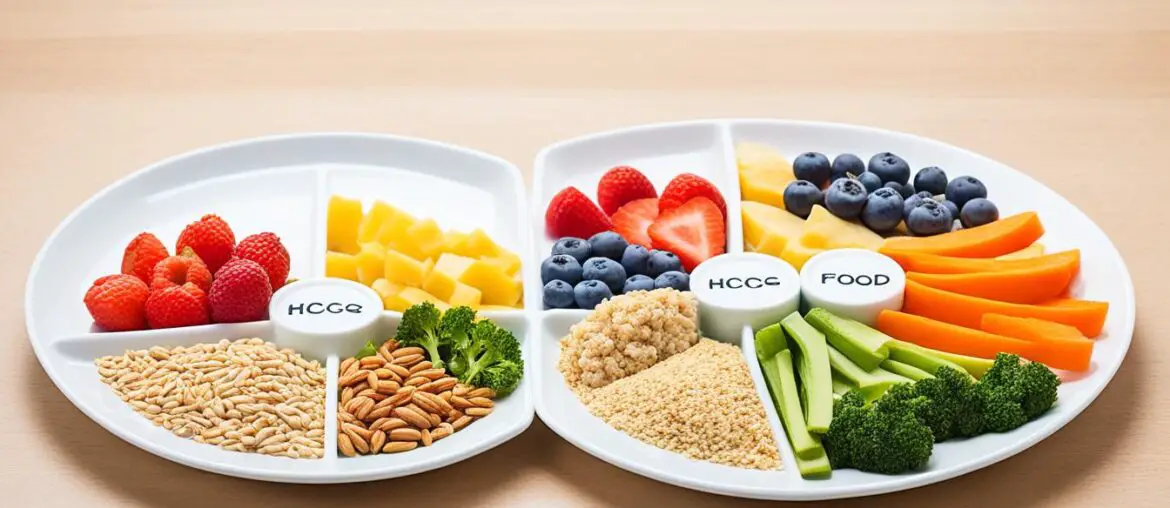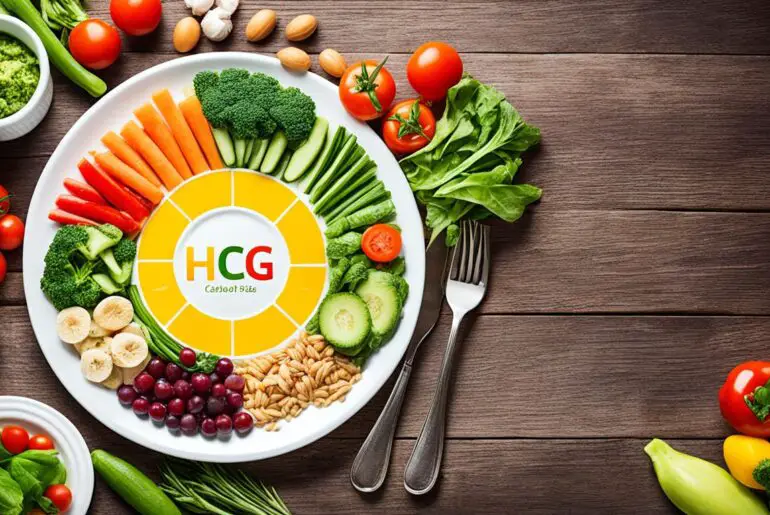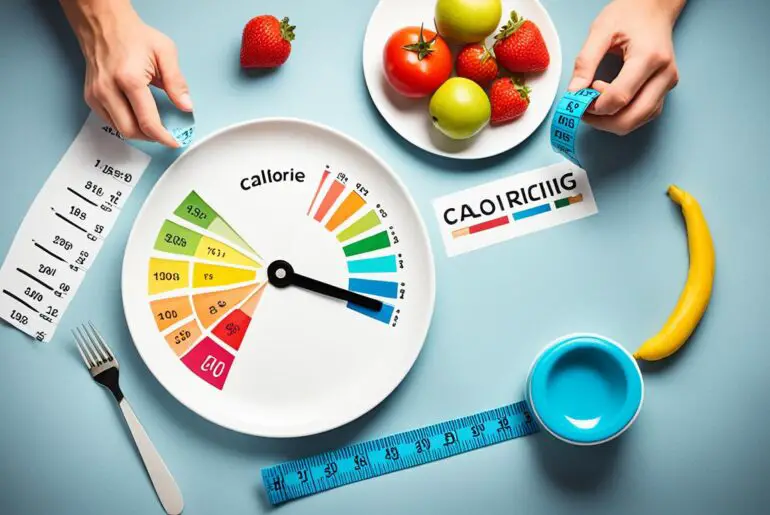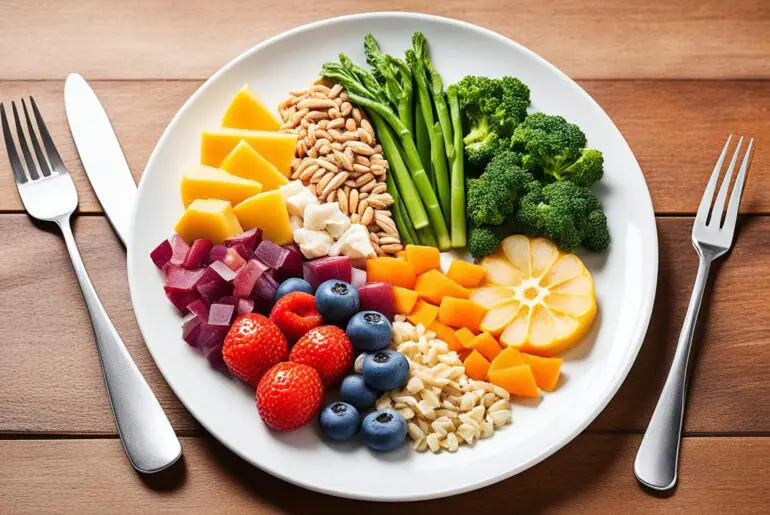Are you looking for a sustainable way to maintain your weight after the HCG Diet? The HCG Diet Maintenance Phase plays a crucial role in re-setting your metabolism and ensuring long-term success. But how do you determine the right calorie intake during this phase? Is it possible to enjoy carbohydrates again without undoing your weight loss achievements? Let’s explore the secrets of HCG Diet Maintenance Phase Calorie Intake and discover the key to lasting weight maintenance.
Key Takeaways:
- Understanding the importance of calorie intake during the HCG Diet Maintenance Phase
- The role of the hypothalamus in re-setting your metabolism
- Gradually reintroducing carbohydrates while monitoring your weight
- The significance of protein intake and avoiding low-calorie diets
- Weighing yourself daily and implementing a steak day if necessary
HCG Diet Maintenance Phase Guidelines
During the HCG Diet Maintenance Phase, it is important to follow specific guidelines to ensure successful weight maintenance. These guidelines provide the framework for maintaining the progress made during the HCG Diet Protocol.
Caloric Intake
After your last HCG injection, you should continue to follow a 500 calorie diet for the first 72 hours of the maintenance phase. This allows your body to transition smoothly from the low-calorie phase to a higher-calorie intake.
It is crucial to gradually increase your caloric intake after the initial 72 hours. This gradual increase helps your metabolism readjust to higher calories without causing weight gain.
Focusing on Protein
Protein plays a vital role during the HCG Diet Maintenance Phase. It helps repair and rebuild your body’s tissues, supports muscle growth, and aids in maintaining satiety. Therefore, ensure that your daily meals include an adequate amount of protein.
Avoiding Low-Calorie Diets
While it may be tempting to continue following a low-calorie diet during the maintenance phase, it is essential to avoid it. Low-calorie diets can have a negative impact on your metabolism and hinder your weight maintenance efforts.
Checking Condiments
Condiments can often contain hidden sugars and carbohydrates. It is crucial to check condiment labels and ensure they comply with the guidelines for sugar and carbohydrate content. Opt for condiments that are low in sugar and carbohydrates to support your weight maintenance goals.
Moderate Dairy, Fruit, and Nut Intake
Dairy, fruits, and nuts should be consumed in moderation during the HCG Diet Maintenance Phase. While they provide essential nutrients, they can also contribute to weight gain if consumed excessively. Practice portion control when incorporating these foods into your diet.
Exercise and Injections
Exercise is allowed during the maintenance phase and can help support weight maintenance. Additionally, taking B12 or MIC-2 injections can provide additional support in maintaining your weight loss achievements.
| Guidelines | Recommendations |
|---|---|
| Caloric Intake | Follow a 500 calorie diet for 72 hours after the last injection. Gradually increase caloric intake thereafter. |
| Protein Intake | Incorporate an adequate amount of protein into your daily meals. |
| Low-Calorie Diets | Avoid low-calorie diets, as they can lower your metabolism. |
| Condiments | Check condiment labels for sugar and carbohydrate content. |
| Moderate Intake | Consume dairy, fruits, and nuts in moderation. |
| Exercise and Injections | Engage in regular exercise and consider B12 or MIC-2 injections. |
Following these HCG Diet Maintenance Phase Guidelines will help you maintain your weight loss achievements and establish a sustainable healthy lifestyle.
Recommended Foods for HCG Diet Maintenance Phase
In the HCG Diet Maintenance Phase, it is important to focus on foods that are low in carbohydrates to support weight maintenance. Here are some recommended foods that can be incorporated into your HCG Maintenance Phase food list:
Lean Meats
Include lean meats such as chicken, fish, and beef in your diet. Opt for unprocessed cuts that are not high in fat to ensure a healthy protein source.
Vegetables
Include vegetables like spinach, lettuce, cucumbers, and broccoli in your meals. These vegetables are permitted and provide essential nutrients without high carbohydrate content.
Fruits
Choose fruits like berries and apples, which are preferred options during the HCG Diet Maintenance Phase. It is recommended to consume high-sugar fruits like bananas and melons in moderation.
Nuts and Seeds
Enjoy nuts and seeds in moderation as they provide healthy fats and essential nutrients. Be mindful of portion sizes to maintain calorie control.
Fats and Oils
Limit your intake of fats and oils during this phase. Choose healthier options such as olive oil, avocado, or nuts for added flavor and nutrition.
Avoided Foods
Avoid sugary condiments, bread, pasta, and other high-carbohydrate foods that can undermine your weight maintenance efforts.
It is important to remember that individual dietary needs may vary, so consult with a healthcare professional or nutritionist to tailor your HCG Diet Maintenance Phase food list to your specific needs.
Mistakes to Avoid on HCG Diet Maintenance Phase

When embarking on the HCG Diet Maintenance Phase, it is crucial to be aware of common mistakes that can hinder your progress and lead to weight gain. By avoiding these pitfalls, you can maximize the effectiveness of the maintenance phase and maintain your weight loss achievements.
1. Overindulging in Cautionary Foods
One of the most common mistakes is consuming too many cautionary foods, such as sugars, carbohydrates, and starchy vegetables, especially during the initial 3 weeks of the phase. These foods can disrupt the delicate balance necessary for weight maintenance. It is important to adhere to the recommended food list and portion sizes to prevent unwanted weight gain.
2. Caloric Intake Imbalance
Another mistake to avoid is consuming calories outside the recommended range. Overeating or undereating can both hinder your progress. Strive to stay within the specified calorie range to support your body’s ability to maintain a healthy weight.
3. Adding Multiple Cautionary Foods Simultaneously
Adding too many cautionary foods to your diet at once can overwhelm your system and lead to weight gain. It is advisable to introduce new foods gradually, allowing your body to adjust and respond accordingly. Monitor your weight during this process and make adjustments as needed to avoid any negative impacts.
4. Hidden Sugars and Starches
Be vigilant in reading labels and checking for hidden sugars or starches in supplements, vitamins, and processed foods. Even seemingly innocent products can contain hidden ingredients that can sabotage your weight maintenance efforts. Opt for natural, unprocessed options whenever possible to minimize this risk.
5. Lack of Daily Tracking and Weighing
Keeping track of your daily food intake and weighing yourself regularly are essential habits for staying on track and avoiding weight gain. By monitoring your progress, you can identify any patterns or trends that may need adjustments and take corrective measures promptly.
6. Inadequate Protein Consumption
Ensuring an adequate protein intake is vital for weight maintenance during the HCG Diet Maintenance Phase. Protein helps preserve muscle mass, supports satiety, and aids in overall metabolic health. Make sure to incorporate lean sources of protein into your daily meals to aid your body’s ability to maintain a healthy weight.
By avoiding these common mistakes, you can navigate the HCG Diet Maintenance Phase with confidence, supporting lasting weight maintenance and a healthier lifestyle overall.
| Mistakes to Avoid | Impact |
|---|---|
| Overindulging in cautionary foods | Disrupts weight maintenance |
| Caloric intake imbalance | Can hinder progress |
| Adding multiple cautionary foods simultaneously | Overwhelms the body, may lead to weight gain |
| Hidden sugars and starches | Sabotages weight maintenance efforts |
| Lack of daily tracking and weighing | Difficult to identify patterns and make necessary adjustments |
| Inadequate protein consumption | Affects weight maintenance and muscle preservation |
Tips for Successful Weight Maintenance on HCG Diet Maintenance Phase
To successfully maintain your weight during the HCG Diet Maintenance Phase, it is important to follow some tips. First, focus on portion control and avoid overeating. Make sure to balance your meals with protein, vegetables, and fruits to provide your body with essential nutrients.
Stick to the Recommended Food List
Adhering to the recommended food list is crucial for successful weight maintenance. Avoid high-carbohydrate foods that can lead to weight gain. Instead, choose lean proteins, such as chicken, fish, and beef, along with plenty of vegetables and fruits that are low in sugar.
Track Your Daily Intake
Keeping a food journal or using an app to track your daily intake can help you stay accountable and make informed choices. Record your meals and portion sizes to ensure you are within the recommended calorie range.
Weigh Yourself Regularly
Weighing yourself daily can help you monitor any fluctuations in weight and make necessary adjustments to your diet or exercise routine. It’s important not to obsess over minor changes but rather focus on long-term trends.
Incorporate Exercise
Regular physical activity is essential for weight maintenance. Incorporate exercises such as walking, cycling, or strength training into your routine to support your overall health and keep your metabolism active.
Stay Hydrated and Get Enough Sleep
Hydration is important for maintaining optimal bodily functions. Drink plenty of water throughout the day to stay hydrated. Additionally, make sure to get enough sleep as it plays a crucial role in weight management and overall well-being.
By following these tips, you can increase your chances of successful weight maintenance during the HCG Diet Maintenance Phase.
Plateau Breaking Strategies for HCG Diet Maintenance Phase

If you encounter a weight loss plateau during the HCG Diet Maintenance Phase, it can be frustrating. However, there are several strategies you can try to break through this plateau and continue making progress towards your weight loss goals.
- Increase water intake: Staying hydrated is important for overall health, but it can also help with weight loss. Drinking an adequate amount of water can boost your metabolism and help your body burn calories more effectively.
- Increase protein intake: Protein is essential for muscle growth and repair, but it can also play a role in breaking through a weight loss plateau. Adding a little more protein to your meals, such as lean meats, fish, eggs, or plant-based protein sources, can help increase satiety and boost your metabolism.
- Incorporate “steak days”: A steak day involves eating only a large steak and an apple or tomato for dinner. This strategy can help jumpstart weight loss by creating a calorie deficit and reducing water retention.
- Check condiments and food labels: Hidden sugars and additives in condiments or processed foods can sabotage your weight loss efforts. Check labels carefully to ensure you’re not unknowingly consuming extra calories or sugars.
- Avoid certain foods: Some foods, such as breadsticks or processed meats with added sugars, can hinder weight loss progress. By eliminating these foods temporarily, you may be able to break through the plateau.
- Evaluate lifestyle factors: Changes in medication or lifestyle habits can impact your weight loss journey. Take a look at any recent changes and consider if they may be affecting your weight. Consulting with a healthcare professional may also provide valuable insights.
- Add light exercise: Incorporating light exercise, like brisk walking or yoga, into your routine can help boost your metabolism and burn extra calories. Plus, exercise offers numerous other health benefits.
- Incorporate apple cider vinegar: Some studies suggest that apple cider vinegar may have weight loss benefits. Adding a small amount to your daily routine, such as mixing it with water or using it in salad dressings, may be worth a try.
Remember, everyone’s body is unique, and what works for one person may not work for another. It’s essential to experiment and find the strategies that work best for you. If you’re unsure or struggling to break through a plateau, consider consulting with a healthcare professional or a registered dietitian who specializes in the HCG Diet Maintenance Phase.
Importance of Tracking and Measuring on HCG Diet Maintenance Phase
Tracking and measuring your progress during the HCG Diet Maintenance Phase is crucial for successful weight maintenance. It allows you to stay accountable, make informed adjustments, and understand how your body responds to different factors.
The Benefits of Tracking
Keeping a record of your daily food intake, including portion sizes and ingredients, can help you identify trigger foods that may cause weight gain. By tracking what you eat, you can pinpoint any patterns or habits that might be hindering your progress. This awareness empowers you to make healthier choices and tailor your diet to suit your body’s needs.
Weighing yourself every day and recording your weight helps you monitor any fluctuations and stay within the desired weight range. It provides valuable feedback on how your body responds to certain foods or activities. If you notice a sudden increase in weight, you can take prompt action to address it, such as adjusting your caloric intake or incorporating more physical activity.
The Importance of Measuring
In addition to tracking your weight, measuring specific areas of your body can offer deeper insights into your progress. By using a tape measure, you can track changes in key areas like the bust, waist, hips, inner thighs, and biceps. These measurements can reflect changes in body composition, even if the scale doesn’t show significant weight loss. It’s a tangible way to measure progress beyond just the numbers on a scale.
Visualizing Progress
Moreover, tracking and measuring can help you visualize your progress. Seeing your efforts translate into tangible results can be highly motivating and reinforce your commitment to weight maintenance. It allows you to celebrate milestones, no matter how small, and helps you stay focused on your long-term goals.
Strategies for Long-Term Weight Maintenance

To achieve long-term weight maintenance after the HCG Diet Maintenance Phase, it is important to develop healthy habits. By focusing on a balanced and nutritious diet that includes a variety of foods from all food groups, you can support your body’s needs and sustain your weight loss achievements. Incorporating regular exercise into your routine not only helps with weight management but also promotes overall health and well-being. Remember to practice portion control and avoid overeating, as this can lead to weight gain over time. Getting enough sleep and managing stress levels are also crucial factors in maintaining a healthy weight.
Keeping track of your weight is essential for long-term weight maintenance. By monitoring your weight regularly, you can make adjustments to your diet and exercise routine if necessary. It is important to surround yourself with a supportive environment that encourages healthy habits and lifestyle choices. Seeking professional guidance, such as working with a registered dietitian or weight management specialist, can provide you with personalized strategies and support to ensure successful long-term weight maintenance.
“Long-term weight maintenance requires dedication and consistency in maintaining healthy habits.”
Benefits of Long-Term Weight Maintenance
Long-term weight maintenance offers several benefits for your overall health and well-being. By adopting a sustainable lifestyle that supports a healthy weight, you can reduce the risk of chronic diseases such as heart disease, diabetes, and certain types of cancer. Maintaining a healthy weight also improves energy levels, enhances mood and self-confidence, and promotes better sleep quality. Additionally, long-term weight maintenance allows you to enjoy a higher quality of life by engaging in physical activities and achieving personal goals.
Habits for Long-Term Weight Maintenance
| Habits | Description |
|---|---|
| Eat a Balanced Diet | Include a variety of foods from all food groups, focusing on nutrient-dense options. |
| Exercise Regularly | Incorporate physical activity into your routine to support weight management and overall health. |
| Practice Portion Control | Avoid overeating and be mindful of serving sizes to maintain a healthy weight. |
| Get Adequate Sleep | Prioritize getting enough sleep as it affects your metabolism and overall well-being. |
| Manage Stress Levels | Find healthy ways to cope with stress, such as through exercise, meditation, or social support. |
| Track Your Weight | Monitor your weight regularly to stay accountable and make adjustments if necessary. |
| Surround Yourself with Support | Build a supportive environment that encourages healthy habits and positive lifestyle choices. |
| Seek Professional Guidance | Consult with healthcare professionals, registered dietitians, or weight management specialists for personalized strategies and support. |
Adopting these habits and integrating them into your daily life can lead to successful long-term weight maintenance. Remember, maintaining a healthy weight is a lifelong journey, and by making positive choices and practicing healthy habits, you can enjoy the benefits of a balanced and sustainable lifestyle.
Conclusion
The HCG Diet Maintenance Phase is a crucial period for maintaining the weight loss achievements and overall success of the HCG Diet. During this phase, careful attention to calorie intake is essential. Gradually increasing caloric intake while focusing on protein-rich foods is key to sustaining weight loss and promoting a healthy balance.
By following the guidelines for food choices, such as avoiding high-carbohydrate foods and monitoring portion sizes, individuals can effectively manage their weight during the maintenance phase. Tracking and measuring progress, including regular weigh-ins and body measurements, can help individuals stay accountable and make necessary adjustments to their diet and lifestyle.
Additionally, implementing strategies to break through plateaus, such as increasing water intake and incorporating “steak days,” can revitalize weight loss efforts. However, it is important to remember that long-term weight maintenance requires the development of healthy habits. This includes adopting a sustainable approach to eating, regular exercise, adequate sleep, and stress management.
By maintaining these healthy habits and taking a long-term approach to weight management, individuals can successfully sustain their achievements from the HCG Diet Maintenance Phase and enjoy lasting effects of the HCG Diet.
FAQ
What is the calorie intake during the HCG Diet Maintenance Phase?
During the HCG Diet Maintenance Phase, it is recommended to gradually increase your caloric intake from 500 calories to a higher range.
How long does the HCG Diet Maintenance Phase last?
The HCG Diet Maintenance Phase should be followed for 6 weeks.
What foods should be avoided during the HCG Diet Maintenance Phase?
Carbohydrates such as sugar, rice, bread, potatoes, and pastries should be avoided during the HCG Diet Maintenance Phase.
Can I eat protein in the HCG Diet Maintenance Phase?
Yes, it is recommended to eat a lot of protein in the first few days of the HCG Diet Maintenance Phase to replenish your body.
How often should I weigh myself during the HCG Diet Maintenance Phase?
It is important to weigh yourself daily during the HCG Diet Maintenance Phase.
What should I do if I am two pounds over my weight limit during the HCG Diet Maintenance Phase?
If you are two pounds over your weight limit, you should have a “steak day” where you eat only a large steak and an apple or tomato for dinner.
What are some common mistakes to avoid during the HCG Diet Maintenance Phase?
Common mistakes to avoid include eating too many cautionary foods, not consuming enough protein, and not tracking your daily food intake.
Are there any tips for successful weight maintenance during the HCG Diet Maintenance Phase?
Tips for successful weight maintenance include focusing on portion control, tracking your daily food intake, and incorporating exercise into your routine.
How can I break through a weight loss plateau during the HCG Diet Maintenance Phase?
Some strategies to break through a weight loss plateau include increasing water intake, incorporating “steak days,” and checking food labels for hidden sugars.
Why is tracking and measuring progress important during the HCG Diet Maintenance Phase?
Tracking and measuring progress allows you to stay accountable, identify trigger foods, and make adjustments if necessary.
What strategies can I use for long-term weight maintenance after the HCG Diet Maintenance Phase?
Strategies for long-term weight maintenance include developing healthy eating habits, incorporating regular exercise, and maintaining a balanced and nutritious diet.




